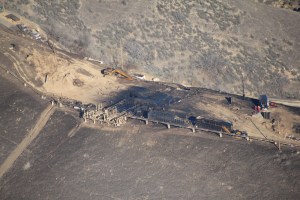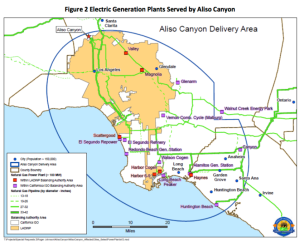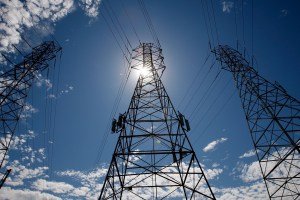Southern California could see as many as 14 days of interrupted electricity supply during high-demand days this summer as a direct result of the monthslong leak and ensuing shut down of the Aliso Canyon natural gas field above Porter Ranch, according to a state report released Tuesday.

Millions of electricity customers could be affected by service interruptions — aka blackouts — according to a report from the California Public Utilities Commission and other agencies.
The risks to energy reliability in greater Los Angeles were assessed in a 56-page report by state and local energy experts. Authorities separately released a 33-page “action plan” to address the response to possible energy shortages.
“We do not anticipate rolling blackouts. We do anticipate that we may have scheduled outages,” said Robert Weisenmiller, chair of the state Energy Commission, told the Los Angeles Times.
Since the leak at the Aliso Canyon facility was detected in October, its operator, Southern California Gas Co., has been prohibited from injecting new natural gas into the massive underground storage field. Meanwhile, the company has been ordered to inspect all 114 of its wells at the facility, in the Santa Susana Mountains, and determine they’re safe.

Because it can’t add new gas to the field, the facility is at one-fifth capacity, or about 15 billion cubic feet, according to the action plan.
Aliso Canyon supplies natural gas to 11 million customers — and to 17 gas-fired power plants that supply electricity to the region.
In short, the gas held there is critical to meeting electrical demand, authorities said.
In a statement, SoCal Gas said the connection between natural gas and the region’s electricity supply has been increasingly complex due to new sources of wind and solar power and the decommissioning of the San Onofre nuclear power plant.
“For decades, SoCalGas has understood the significance of natural gas to Southern California’s electricity supply, and consistently worked with state agencies to help ensure the region has reliable power,” the statement read, in part. “For some time, SoCalGas has been proactively working with the California Energy Commission, CAISO, LADWP, the California Public Utilities Commission and others to anticipate and plan for reliability issues through a series of rules, programs and infrastructure improvements.”
The company’s top priority is providing safe a reliable energy for Southern Californians, the statement emphasized.
In the action plan and the report, officials said that supplies of natural gas from Aliso Canyon have never before been “constrained” to current levels, and that constriction has introduced uncertainty.

“The limited current operations of the facility create a distinct possibility of electricity service interruptions in the coming summer months,” the action plan states.
Electrical supply could be interrupted from 22 to 32 days for millions of customers, with 14 of those days during summer, the report stated.
The power plants supplied by Aliso Canyon are operated by Southern California Edison, the Los Angeles Department of Water and Power, and multiple cities, including Glendale, Burbank, Pasadena and Anaheim, the report states.
Large hospitals and oil refineries also get natural gas from the Gas Co. facility.
The action plan calls for customers to conserve energy, among other 17 recommendations that include use of the “Flex Alert” campaign.
In a statement, Los Angeles Mayor Eric Garcetti urged residents to conserve electricity.
“We can all help get through this tough period by conserving energy, making our buildings more efficient, and taking other actions that reduce our use of electricity and natural gas,” Garcetti said.
He said the city’s utility was working to reduce dependence on natural gas-fired power plants.
The Environmental Defense Fund, a nonprofit advocacy group, issued a statement calling for investment in renewable energy in response to the situation.
“SoCalGas has failed to manage the integrity of Aliso Canyon, and now the reliability of the power system looks to be in jeopardy,” said Tim O’Connor of the nonprofit. “Now is the time to end the gas monopoly and put clean energy investments to work like never before.
The leaking gas well at Aliso Canyon was permanently sealed Feb. 18.
Thousands of Porter Ranch residents were relocated from their homes — at SoCal Gas’ expense — during the monthslong effort to plug the leak, which spewed massive amounts of polluting methane into the air.
Officials from the California Energy Commission, the CPUC and the Los Angeles Department of Water and Power will discuss the action plan at a public meeting in Woodland Hills on Friday.
Tuesday’s report was issued by the CPUC, the state Energy Commission, the grid-operating California Independent System Operator, DWP and the Gas Co.






